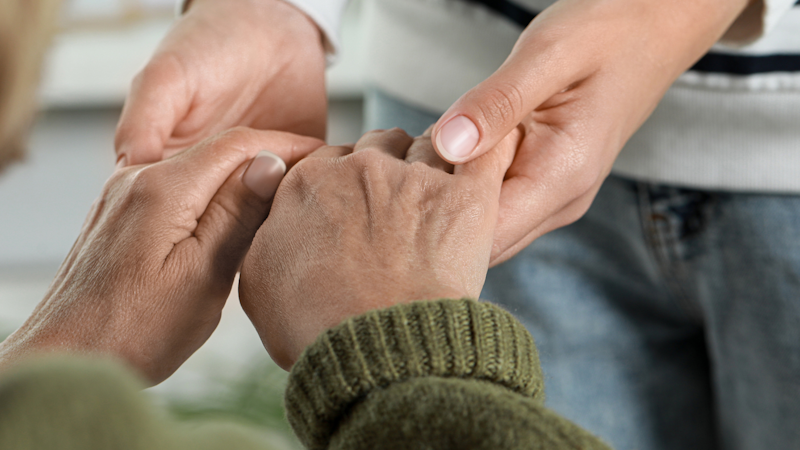Beyond Tired: Coping with Cancer-Related Fatigue
Fatigue is one of the most common symptoms experienced by patients during and after cancer treatment. It can have a significant impact on the daily life of patients and their carers. We look what causes cancer-related fatigue and explore some proven ways to manage it.
September 29, 2025

Fatigue is one of the most common symptoms experienced by patients during and after cancer treatment. In fact, research shows that up to 80–90% of people with cancer experience fatigue at some stage. It can feel overwhelming. Cancer-related fatigue is not the same as ordinary tiredness, and a good night’s sleep or an afternoon nap may not make it go away. For many people, it can feel like a constant weight that affects every part of daily life.
The good news is that there are ways to understand and manage fatigue. Both patients and families can take steps to reduce its impact on daily life.
What Is Cancer-Related Fatigue?
Cancer-related fatigue (CRF) is a persistent feeling of physical, emotional, or mental exhaustion. It’s more than feeling “worn out.” It may affect your body, your mood, and even your ability to think clearly or concentrate. Unlike normal tiredness, this fatigue doesn’t always improve with rest.
Doctors and researchers highlight that CRF is often the most distressing symptom for people with cancer — even more so than pain or nausea.
Why Does Fatigue Happen?
There isn’t just one reason. Fatigue in cancer is caused by several inter-related factors. It may be the effects of:
Cancer – inflammation or the disease process use energy.
Cancer treatment – chemotherapy, radiotherapy, immunotherapy, or surgery all put stress on the body.
Medical factors – anemia (low blood counts), poor nutrition, sleep disturbance, or pain.
Emotional strain – worry, stress, and depression can make fatigue worse.
Other health problems – infections, thyroid issues, or certain medications.
Understanding that fatigue has real medical and emotional causes can help patients and families approach it with greater understanding and some compassion.
How Fatigue Affects Daily Life
Fatigue can touch every aspect of life. You might find it difficult to do everyday tasks, keep up with work, or enjoy hobbies. Some people feel frustrated, guilty, or even misunderstood when they can’t do as much as before. Families sometimes struggle to see why “just resting” doesn’t fix things.
Recognizing that this fatigue is part of the illness — not a sign of weakness — can reduce stress and blame.
Practical Tips for Patients
While there may not be a quick fix, small steps can make a big difference. Studies show the following approaches can help:
Conserve your energy: Prioritize the tasks that matter most to you. Break bigger jobs into smaller steps and allow time for rest in between.
Stay active: Gentle, regular exercise such as walking, stretching, or yoga has been shown to reduce fatigue and improve wellbeing.
Eat and drink well: Aim for small, balanced meals and plenty of fluids. Good nutrition supports your energy levels and recovery.
Improve sleep: Keep a regular bedtime routine. Limit daytime naps and make your sleep environment calm and comfortable.
Care for your emotions: Fatigue is often linked to stress and mood. Mindfulness, relaxation techniques, or speaking with a counsellor can help.
Check with your doctor: Sometimes fatigue has treatable causes like anaemia, thyroid imbalance, or medication side effects.
💡 Note: In some cases, doctors may use medications such as steroids or stimulants to help with fatigue, but these are usually short-term and not suitable for everyone. Lifestyle and supportive approaches remain the most effective long-term strategies.
Supportive Tips for Families and Carers
Families play a vital role in helping a loved one cope with fatigue. Here are some ways to be supportive:
Acknowledge the reality of fatigue – it is real and not laziness.
Be patient – plans may change, and flexibility helps.
Offer help with daily tasks – cooking, shopping, or childcare can lighten the load.
Encourage activity, not pressure – joining your loved one in a gentle walk or stretch can make it feel less like a chore.
Listen – sometimes, the most helpful thing is simply to understand and validate how your loved one feels.
When to Seek Medical Help
It’s important to talk to your healthcare team if:
🚩Fatigue suddenly gets much worse.
🚩It comes with new symptoms like fever, pain, or breathlessness.
🚩It is so severe that safety is affected (such as increased risk of falls or confusion).
🚩It leads to distress, depression, or feeling unable to cope.
Your doctor can help find underlying causes and suggest treatments or referrals to supportive care.
Key Takeaways
Fatigue is one of the most common and distressing symptoms in cancer, but it is not something you have to face alone. It has real medical and emotional causes, and there are ways to make it more manageable.
By combining small lifestyle adjustments, medical support, and understanding from family and friends, fatigue can become less overwhelming. It's not about “pushing through,” but about finding balance, listening to your body, and accepting help when you need it.
Subscribe to our newsletter
Stay informed, inspired, and supported! Our monthly newsletter delivers expert advice, real stories, and practical tips to help you navigate life during and after cancer with confidence and hope.




